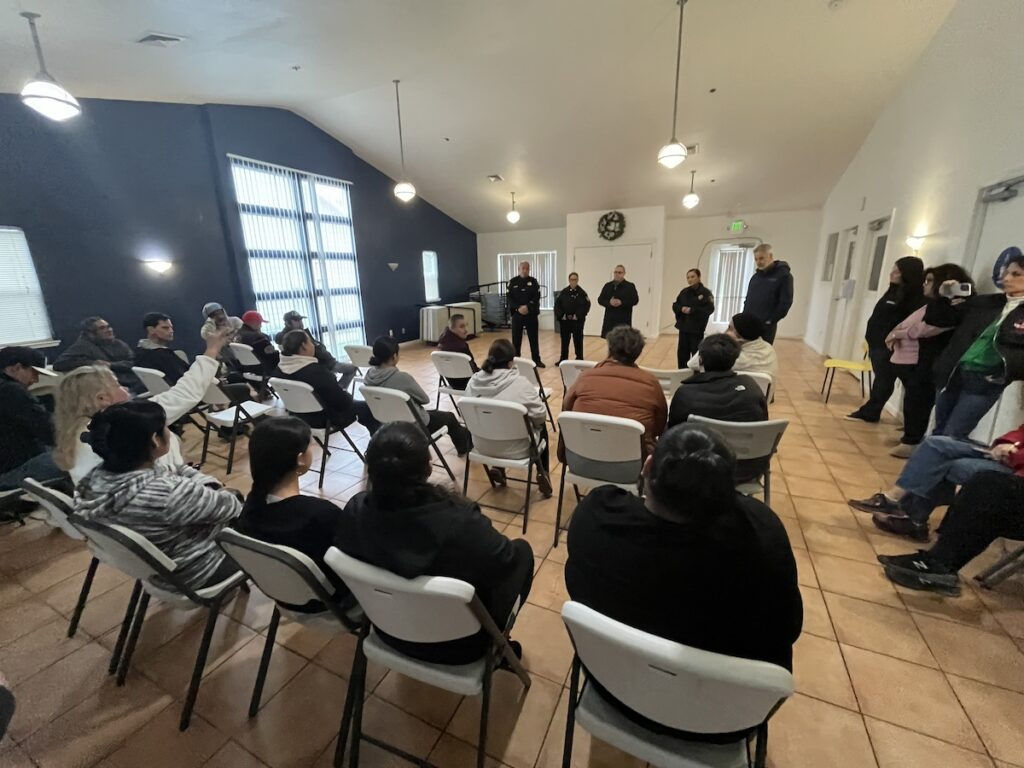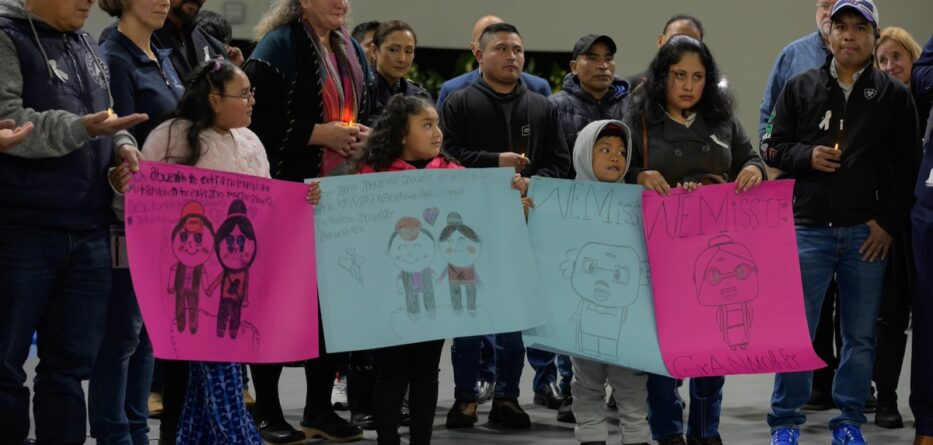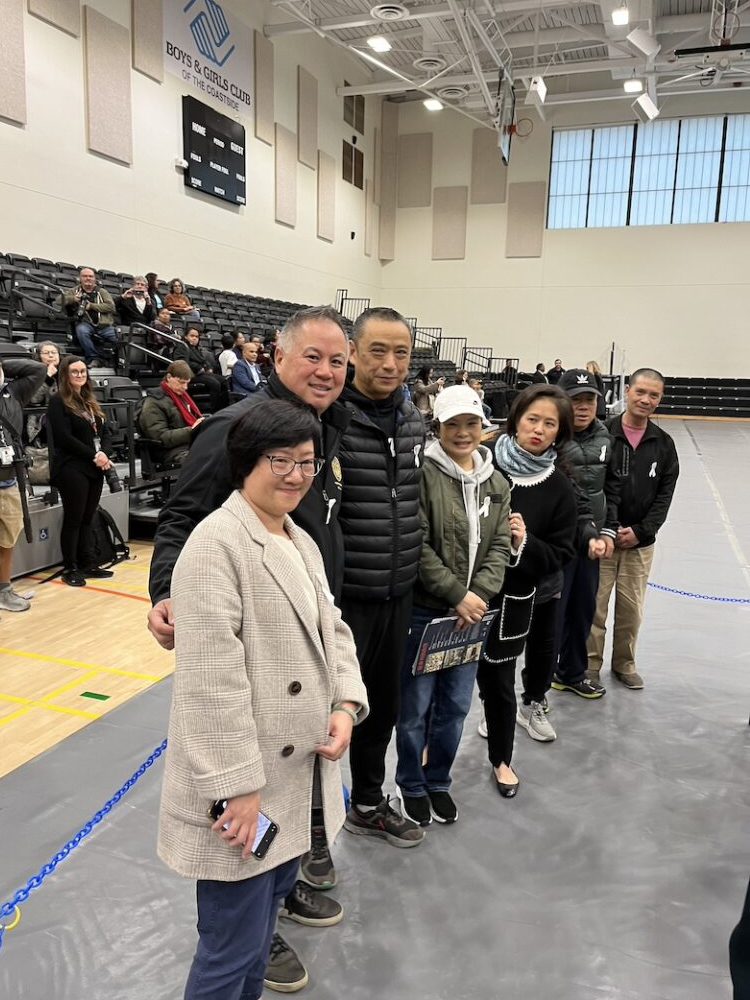HALF MOON BAY – Residents and public officials gathered here recently for a memorial marking the one-year anniversary of a shooting that claimed the lives of seven farmworkers.
The event came on the heels of another shooting the night before at a nearby housing complex, underscoring the challenge of improving living conditions for farmworkers in this small coastal town.
“We arrested the suspect last night,” said San Mateo County Sheriff Christina Corpus, who was on hand for the memorial Sunday evening. “The community is scared,” she added, “and we want to make sure they feel safe.”
There are an estimated 1,700 farmworkers living and working in and around San Mateo County, a largely invisible population separated by language, immigration and economic status.
While a majority are from Mexico and Central America, last year’s shooting also brought to light the existence of a small community of Chinese farmworkers in Half Moon Bay.
Fears of power outages & rising gang presence

Earlier in the day Corpus and several officers from the Sheriff’s office held a townhall meeting at the nearby Moon Ridge Apartments, where the previous evening’s shooting occurred and where many of Half Moon Bay’s farmworkers reside.
The suspect in that shooting has been identified as 18-year-old Orlando Montelongo Chavarin, from Unincorporated San Mateo County Coast. According to law enforcement, the shooting occurred at around 7:30 PM Saturday night. A 22-year-old was injured and later taken to hospital.
While few details have been released, residents at the town hall complained about a power outage the night of the shooting which also led to loss of cell phone service. One young woman described how she hadn’t learned of the shooting until 2:30 the next morning, wondering about her safety and that of her family.
“It happens a lot,” she said of the outage. “It’s a huge issue.”
The discussion later turned to concerns about gang involvement and the lack of resources available to young people in the area, an isolated and largely agricultural region some 30 miles south of San Francisco.
Speaking in Spanish, one mother said she hears from her children about the growing presence of gangs in schools, adding that many in the community are fearful of engaging with law enforcement. “I’m not just speaking for me, but for the whole community,” she said.
Those fears appeared to be vindicated when officials stressed in response that under property regulations, any evidence of gang affiliation on the part of a family member could lead to eviction for the entire family.
“They are young kids, they need help,” the mother stressed as tears rolled down her cheeks.
Others complained that there has been a lot of talk about improving conditions for farmworkers in the year since the January 23 shooting that claimed seven lives but not enough action.

The suspect in that case was identified as Chunli Zhao, originally from China. Five of the seven victims in the shooting also hailed from China, while the two others were from Mexico.
The shooting garnered national headlines, coming just a day after another shooting in Monterey Park, east of Los Angeles, and revealed the deplorable housing conditions that many farmworkers endure.
Farmworker housing a priority
Housing was in fact a central theme of the memorial Sunday evening, which began with a sound healing ceremony combining elements of both Chinese and Latino cultures. Wafts of incense wafted in through the open doors as the memorial got underway.

“Today, let’s not forget that farmworkers provide our food security,” said Half Moon Bay Mayor Joaquin Jimenez, the city’s first Latino mayor. “We owe it to them, their safety, their well-being, and that includes decent housing.”
Jimenez touted the construction of new farmworker housing, calling it the “highlight of the year.”
Officials in Half Moon Bay have raised over $12 million for construction of farmworker housing, several units of which will be set aside for victims of last year’s shooting. Half Moon Bay’s City Council also just approved funding to continue emergency housing for the victims, who have been living in temporary rentals since the night of the shooting, until construction of permanent housing is complete, expected in the spring or summer of 2025.
Some 200 people gathered for the memorial, held at the Boys and Girls Club in downtown Half Moon Bay, a mix of residents, public officials and members of the farm working community, including those directly impacted by the shooting.
“It blew a hole in our hearts,” said Congresswoman Anna Eshoo, whose district includes Half Moon Bay, of the Jan 23 shooting, adding that it “ripped the veil” off a community that until then had gone “unrecognized.”
“We didn’t hear their cries for help,” said Assemblymember Phil Ting, whose district includes portions of San Mateo County. He pointed to the lack of channels available to farmworkers prior to the shooting for lodging complaints regarding employment or housing concerns.
The owners of the two farms where last years’ shooting occurred were later cited by Cal OSHA for numerous health and safety violations.
An office of labor standards enforcement and a housing task force were both created in the wake of the shooting, noted District 3 Supervisor Ray Mueller.

Healing from the trauma
As for the victims, housing is one concern, healing another.
“They are still showing PTSD symptoms,” said Sao Leng U with the San Francisco-based Self Help for the Elderly. U has been working closely with the Chinese farmworkers to provide housing and mental health support over the past year.
Kique Bazan with the non-profit ALAS, which works with Half Moon Bay’s sizable Latino farm working community, told how several of the victims were asked to recount their testimonies as recently as last week as part of ongoing legal proceedings.
“The trauma came back,” he said. “Even the physical symptoms of shaking, stiffening up, aching necks. It was brutal.”
Bazan says the past year has been tough, and while he welcomes the measures taken by local and state officials since last year’s tragedy, the anti-immigrant rhetoric taking hold nationally suggests an ongoing “cluelessness” around what it means to be an immigrant. “We have stopped listening,” said Bazan, “and that is not how we are going to move forward.”































